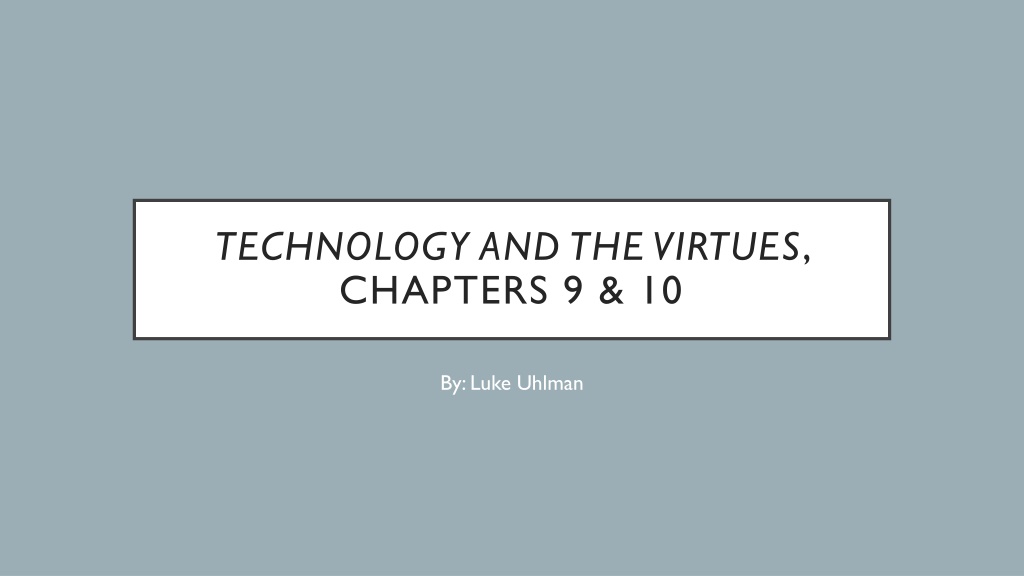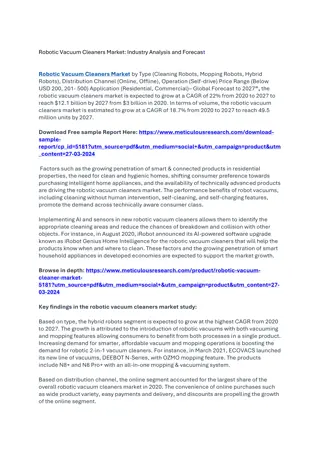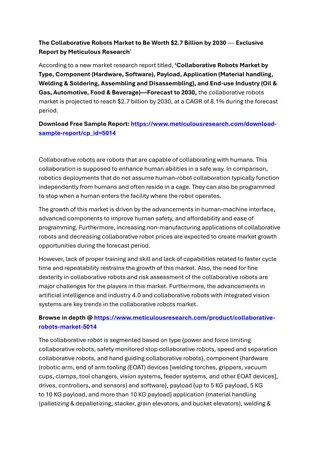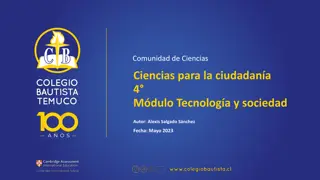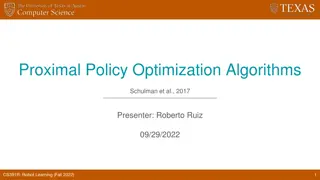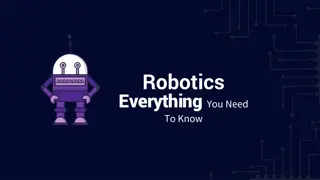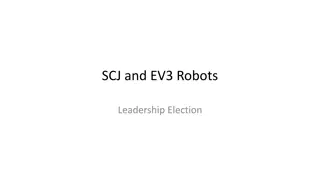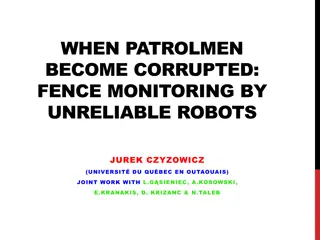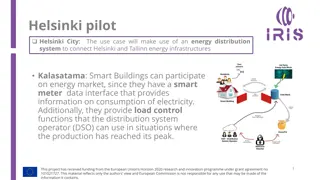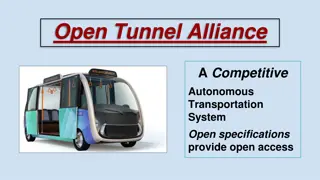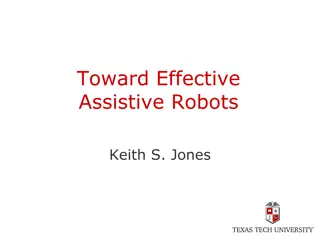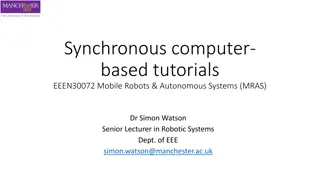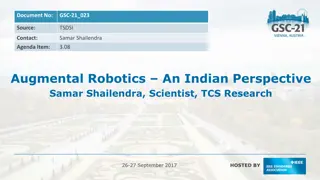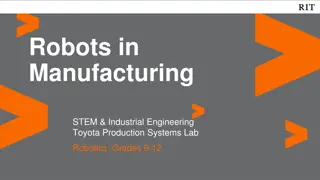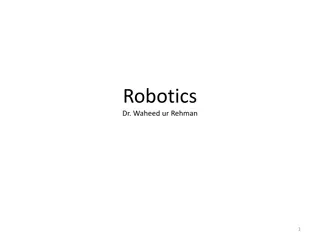Exploring the Ethical Implications of Autonomous Military Robots
The chapters 9 and 10 of "Technology and the Virtues" by Luke Uhlman delve into the ethical dimensions of roboethics, particularly focusing on the virtues in the context of robot ethics. Discussions revolve around the impact of autonomous military robots on virtue cultivation, with emphasis on courage, moral injury, and the role of technomoral courage in policies regarding emerging military technologies. The chapters also explore the development of carebots for assisting vulnerable individuals, reflecting on the ethical considerations associated with their functions.
Download Presentation

Please find below an Image/Link to download the presentation.
The content on the website is provided AS IS for your information and personal use only. It may not be sold, licensed, or shared on other websites without obtaining consent from the author. Download presentation by click this link. If you encounter any issues during the download, it is possible that the publisher has removed the file from their server.
E N D
Presentation Transcript
TECHNOLOGY AND THE VIRTUES, CHAPTERS 9 & 10 By: Luke Uhlman
(9.1) ROBOT ETHICS AS VIRTUE ETHICS Roboethics is the study of robot ethics, but how do robots affect the cultivation of virtue? Deontology and Consequentialism are the dominant ethical frameworks used Vallor believes these ethical traditions are, by themselves, inadequate for roboethics Too rigid and stagnant for the ever-changing nature of technology Not to say deontology and consequentialism have no role to play at all in roboethics First, we will look at autonomous military robots
Semi/fully autonomous military robots: (9.2) AUTONOMOUS MILITARY ROBOTS: COURAGE AND HOPE FOR THE HUMAN FUTURE Sense, and act upon information gathered from the physical environment Calculate and select courses of action independent of human judgement Development of robot soldiers with moral AI underway Debate centers around robots with lethality capacities Courage is the most relevant virtue for this issue How can policymakers reward technomoral courage to realize the potential of emerging military technologies? Discussion Questions: Is courage the most pertinent technomoral virtue at play in the discussion of emerging military technologies? If not, is there any other technomoral virtue which you think is more relevant? Samsung Techwin SGR-1 Robot
Physical injury/death vs. moral injury Virtue ethics tradition tells us to fear moral injury more Do killer robots spare us from experiencing moral injury? Asymmetrical warfare: drone warfare vs. low-tech methods Cultivating moral virtue embedded within military profession (9.3) KILLER ROBOTS AND TECHNOMORAL COURAGE: THE TROUBLES WE DO NOT AVOID Selfless service: what distinguishes soldiers from criminals Hope in military combat: victory, honor in defeat, or more? Are we at an inflection point with automated lethal robots? Hope of preventing endless warfare could be gone if we don t act Discussion Questions: Do we find ourselves at a Wallachian inflection point that we ought to be gravely concerned about? Do autonomous military weapons actually afford the global community a chance to engage in inevitable warfare in a far more humanistic way? More generally, does the use of autonomous military robots aid or hinder our ability to pursue (technomoral) virtue?
(9.4) CAREBOTS AND THE ETHICAL SELF Carebots : social robots designed to assist vulnerable people (elderly, sick, etc.) Functions that Carebots perform (other than basic caregiving tasks): Monitoring the status of those receiving care Providing companionship to those under care Na ve technophilia and reactionary technophobia are equally unwise Categories and questions of roboethics (as laid out by Mark Coeckelbergh): Can artificially intelligent robots be considered moral agents, and deserve robot rights ? Can traditional ethical theories be applied to human-robot interactions? How does our interactions with robots affect us as social and emotional beings?
Care: an activity, an art, and a virtue Should we aim to reduce the care burden on caregivers? Vallor believes there is a moral good internal to caregiving (9.5) Moral meaning of reciprocity, putting empathy into practice TECHNOMORAL CARE IN RELATIONS OF HUMAN DEPENDENCE Nel Noddings two criteria for a caring commitment: Engrossment: understanding/processing the reality of the other Motivational displacement: actively addressing the other s reality We must meet the fear of caregiving with courage Carebots could sustain rather than liberate human caregivers Important to consult with recipients of care about which levels of human and robot interaction they prefer Discussion Questions: Do you think that humans will ultimately cede the responsibility and burden of caregiving to robots? Is there a way you see for us as a society to strike the medium between bearing all caregiving responsibility ourselves and just letting robots do this emotionally straining work? What can we do today to ensure that our vulnerable are adequately cared for?
(10.1) COMPETING VISIONS OF HUMAN (OR POSTHUMAN) FLOURISHING Human enhancement technologies: Genetic, biomechanical, nanomedical, pharmacological (alone or combination) What technomoral virtues do humans need to enhance themselves? Vallor disagrees with bioconservatives view on human enhancement Arguments are unclear, particularly about how they define human dignity A contingent argument from virtue is far more persuasive
Objection: transhumanists are guilty of technomoral hubris Vallor calls for technomoral humility: an honest assessment of our ability to wield technological power responsibly Technomoral courage as a mean between cowardice and rashness Technomoral humility, courage (et. al) make up technomoral wisdom We must know what it is that we ought to wish for, rather than blindly allowing enhancements to chart their own course (10.2) TECHNOMORAL HUMILITY, WISDOM, AND THE ARGUMENT FROM HUBRIS Recommit to moral self-cultivation for the safety of our descendants Biomedical or pharmacological means of accelerating this process? Invest resources in the wider cultivation of technomoral virtue/leadership Science-sophy : wisdom about appropriate uses of scientific/technical power Sacrifice enhancements that impede our cultivation of technomoral virtue Discussion Questions: What are your thoughts on Vallor s proposed solution to ensuring that human enhancement technology doesn t get out of hand? Should she have gone into more specifics as to how we should allocate resources for the cultivation of technomoral virtue? Is her solution actually feasible?
(10.3) TECHNOMORAL VIRTUE AND CONTEMPORARY LIFE: A CRISIS OF MORAL WISHING Autofabrication as a project of self-realization Actions will become increasingly lacking in purpose Must have clear intentions for leveraging technology Will extending life provide us more time to live well? Directionless seeking due to multitude of choices Crisis of wishing paralyzes our practical wisdom Vallor wrote this book to expose the gap between technosocial power & technomoral wisdom Discussion Questions: Any general comments on Ortega y Gasset s writings as described by Vallor? Is our mass consumer culture to blame for society s lack of technomoral wisdom? Is Ortega y Gasset s prediction of the future (without substantive action) too pessimistic or is it valid? Jos Ortega y Gasset (1883-1955)
